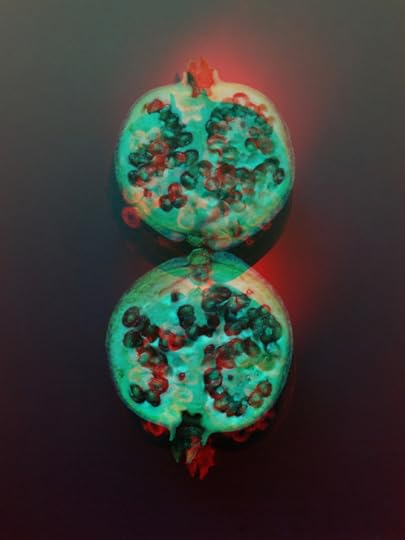Rachel Alexander's Blog, page 359
September 27, 2017
OH MY GOD YOUR BOOK'S TURNING INTO A MOVIE/TV SERIES????? ARE U FOR REAL??? OKay okay this may be misplaced but i hope you dont mind me saying that i am SOOO PROUD omg. i remember reading receiver of many in ffnet (and i got my sis hooked as well) and how
Yep! For real.
I mean, it’s being shopped right now, which is the stage that comes before a project is optioned. So it’s not on the screen YET.
And yeah. The way I started out was by publishing Receiver of Many for free on Literotica, FF.net, FP.net and AO3. My husband did the editing for each chapter that went up. I took a hiatus to get married, and then started publishing what would become Destroyer of Light once I got back from the honeymoon.
And the rest is history.
a-gnosis:
I’ve read The Homeric Hymn to Demeter: Translation,...

I’ve read The Homeric Hymn to Demeter: Translation, Commentary, and Interpretive Essays edited by Helene P. Foley. Despite the fact that it contained a little too much psychoanalysis for my taste, it was an interesting read. The part that stuck with me was Foley’s own interpretation of the Hymn.
According to Foley, divine existence is partly defined in epic by the gods’ ability to break the rules of human society and avoid the consequences that would have occurred in a mortal context. Even if more constraints are put on the goddesses, they enjoy a freedom that mortal women did not. The Hymn shows that for mortals, like the daughters of Keleos, the best that could be wished for any young woman is marriage and children, and especially a male heir to propagate the family line. But this was not always the rule for goddesses. They mature to an age appropriate to their function (they may choose to remain virgins) and do not need marriage to procreate (Demeter is a good example of that). And if they marry, their marriages are different from that of mortals.
Foley points out that, because Olympian gods live as one community, their marriages are in essence endogamous (between insiders) and do not require the separation of the daughter from her natal family. Nor did it require loss of indepence on the part of the female Olympian, who continued to exercise her own perogatives in the sphere allotted to her.
Persephone’s marriage with Hades is, according to Foley, something new to Olympus, something that more resembles a mortal marriage since the inaccessability of Hades’ realm brutally separates mother and daughter: “Thus Persephone is subjected to an extreme form of virilocal exogamy in which she is permanently denied access to her parents. As with other aspects of the Hymn, this marriage, in which the bride undergoes a symbolic death in the transition from one household to another, brings Persephone closer to human experience.”
However, both Demeter and Persephone refuse to accept this arrangement. A compromise takes place and as a result Persephone not only gain her own honors from Hades, but her marriage becomes quite different from that of a mortal woman. She will spend more time with her natal family than with her spouse (at least in the Hymn’s version. Other versions distribute the time more equally). “Nor does she in any extant version of the abduction myth (including the Hymn) explicitly fulfill the normal purpose of Greek marriage by producing a child with Hades (who does not, as eternal Lord of the Dead, need an offspring in any case).”
But according to Foley, in the Hymn, it is Demeter’s and Persephone’s experiences that leads to the establishing of the Eleusinian Mysteries. In other versions of the myth the Mysteries are Demeter’s gift to mankind because of human witnesses who told her what had happened to her daughter. But in the Hymn Demeter already knows about Persephone’s abduction when she arrives at Eleusis. Humans do not earn the Mysteries in the Hymn’s version, instead the Mysteries are founded because deities shared for a time a version of the mortal lot and Demeter was reunited with Persephone.
“The poem, above all by its structure, suggests that, although mortals will never understand divinity, and divinity can never be more than partially and temporarily humanized, it was the profound and unique convergence of the two worlds that produced the Mysteries.”
metras:
METRAS’ RECEIVER OF MANY FANCAST“Earth” CharactersEmily...






METRAS’ RECEIVER OF MANY FANCAST
“Earth” Characters
Emily Browning as Minthe
Max Irons as Triptolemus
Eoin Macken as Sisyphus
Bridget Regan as Metaneira
Arden Cho as Eris
Aneurin Barnard as Eumolpus
September 26, 2017
foodgasms360:
Temptation during full moon | D-1
elvepapercut:
Pomegranate
atilayumusakkaya:
Pomegranate by Atila Yumusakkaya
September 25, 2017
metras:
pri0r:Oh my GOD @safeway it is fall where the h*ck are the pomegranates Update: Whole Foods...
Oh my GOD @safeway it is fall where the h*ck are the pomegranates
Update: Whole Foods has saved my whole ass
^ me, every single damn fall.
kata-chthonia:
My pen slipped. I mapped out the entire 8-9 book series this evening. Thought you...
My pen slipped. I mapped out the entire 8-9 book series this evening. Thought you should know.






